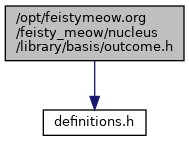#include "definitions.h"

Go to the source code of this file.
Classes | |
| class | basis::outcome |
| Outcomes describe the state of completion for an operation. More... | |
Namespaces | |
| basis | |
| The guards collection helps in testing preconditions and reporting errors. | |
Macros | |
| #define | PROMOTE_OUTCOME(outc) if (outc != common::OKAY) return outc |
| checks if the outcome indicates non-okay completion and returns it if so. More... | |
| #define | DEFINE_OUTCOME(NAME, CURRENT_VALUE, INFO_STRING) NAME = CURRENT_VALUE |
| Provides a way to define auto-generated outcome values. More... | |
| #define | DEFINE_API_OUTCOME(NAME, CURRENT_VALUE, INFO_STRING) NAME = CURRENT_VALUE |
| Similar to standard outcomes (above), but these cannot be auto-incremented. More... | |
Macro Definition Documentation
◆ DEFINE_API_OUTCOME
| #define DEFINE_API_OUTCOME | ( | NAME, | |
| CURRENT_VALUE, | |||
| INFO_STRING | |||
| ) | NAME = CURRENT_VALUE |
Similar to standard outcomes (above), but these cannot be auto-incremented.
This macro specifies an outcome definition where the value is constant, because it must participate in a network API. Standard outcomes are just return values from method calls signifying completion, but the API style outcomes can be used to describe remote procedural invocations. Thus, once they are established with unique values, those values cannot change.
◆ DEFINE_OUTCOME
| #define DEFINE_OUTCOME | ( | NAME, | |
| CURRENT_VALUE, | |||
| INFO_STRING | |||
| ) | NAME = CURRENT_VALUE |
Provides a way to define auto-generated outcome values.
This macro provides a way to mark our outcome values so that parsers can find all of them when needed. NOTE: do not use the macro in CPP files; it's only for headers. if you define outcomes in CPP files, they will not be added to the build manifest, nor will they be guaranteed to be unique or auto-generated.